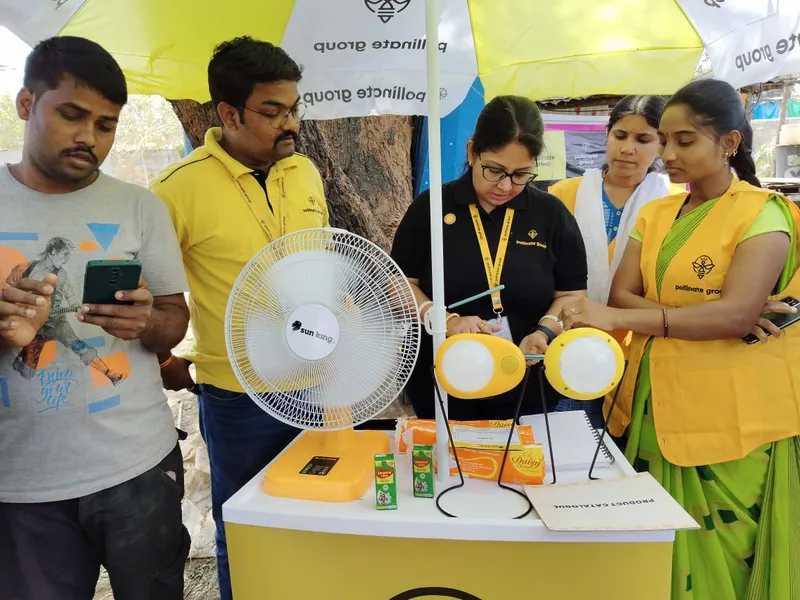Helping women attain financial freedom via digital literacy, entrepreneurship
Project slice-Shiksha, launched in October 2023, constituted a six-month-long training programme in digital literacy with a focus on digital transaction methods such as UPI, cash and time management, and more.
For years, Manjula, who lives in Bengaluru’s Vijayanagar worked as a construction labour. However, with the help of Pollinate Group, an NGO that empowers women to become entrepreneurs, she started selling solar fans and lights in her neighbourhood. Today, depending on her sales, she earns Rs 10,000-25,000 per month.
Manjula is one of the 100 women, who have become entrepreneurs under the Project slice-Shiksha. The project is a part of the Pollinate Suryamukhi programme.
“I learnt to use UPI, how to sell products and build customer relations as a businesswoman. It has been really helpful,” she tells HerStory.
Founded in 2012, the Pollinate Group works on three UN SDGs (sustainable development goals)–no poverty; gender equality; and affordable, reliable, sustainable, and modern energy for all. The NGO aims to improve the livelihoods of marginalised communities and empower women in both India and Nepal.
Last October, fintech startup slice collaborated with the NGO to work towards women's empowerment. Together they launched Project slice-Shiksha which consisted of a six-month-long training programme in digital literacy.
"Through this project, we wanted to enhance our efforts in providing financial literacy to these underserved women. Additionally, we also trained them in selling products and made them economically independent so that they can express themselves freely and make decisions for the family as well," says Sujatha Ramani, CEO of Pollinate Group.

The first cohort consisted of 100 women
Giving rise to women entrepreneurs
The first cohort of this programme was conducted across Bengaluru, Mysuru, and Tumakuru. A team of nine field members were deployed at different slum areas in Vijayanagar, RR Nagar, HBR Layout, and Ramamurthy Nagar to train the women.
The teams of slice and Pollinate conducted a survey of 103 women and found that about 34% had no prior digital transaction experience.
The training focused on digital literacy with a focus on digital transaction methods such as UPI, cash and time management, business management, marketing strategies, customer relations, and an orientation on the health, hygiene, and environmental impacts of Pollinate’s products.
Ramani explained that after conducting a basic community need assessment, these women were provided with clean energy products like solar fans, lights, women hygiene-related products and more.
Each woman receives a minimum of one hour of training daily. The field team covers around three to four women every day. In the last six months, the organisation has conducted around 280 training sessions.
“A significant portion of India’s diversity is the untapped potential of women, many of whom lack access to basic financial education and resources. Collaborating with an organisation like Pollinate gives a fintech company like slice an opportunity to go beyond business metrics. Through this project, we're helping women transform into key financial players within their families and communities,” says slice’s spokesperson.

In the last six months, the organisation has conducted around 280 training sessions
Ameenbi, who hails from Nayandahalli, near PES College, also used to work as a construction labourer. Like Manjula, Ameenbi now sells solar fans in her neighbourhood.
She says that she now makes Rs 10,000 a month which is much more than her previous income. She further explains that through this programme, she has learned to conduct online financial transactions and has become more digitally equipped.
“By channelling resources into empowering women financially is not just about social good, but about creating a more inclusive and accessible financial ecosystem that can drive economic growth,” the spokesperson adds.
The first cohort ends in March and the organisation plans to start the next one soon.
(The copy was updated to fix a typo)
Edited by Affirunisa Kankudti







